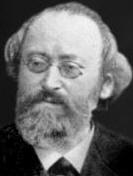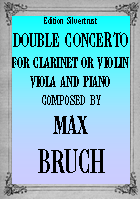Presents
Max Bruch
|
SOUNDBITES Clarinet, Viola And Piano - |
 |
SOUNDBITES Violin, Viola And Piano - |
Double Concerto in e minor, Op.88
For Clarinet or Violin, Viola and Piano
 Max Bruch
(1838-1920) is a fairly well-known composer. He enjoyed a long career as a
conductor, teacher and composer. His works for violin and orchestra are still
part of the repertoire that is often performed.Bruch
composed his Double Concerto in e minor, Op.88 in 1911. It was written for his
son Max Felix Bruch, a first rate clarinetist and Willy Hess, a leading soloist
on both the violin and viola. Hess was a close personal friend of the composer.
Hess and Max Felix premiered the work both in 1911 with orchestras in
Wilhelmshaven and then in 1912 in Berlin off of manuscript copies
Max Bruch
(1838-1920) is a fairly well-known composer. He enjoyed a long career as a
conductor, teacher and composer. His works for violin and orchestra are still
part of the repertoire that is often performed.Bruch
composed his Double Concerto in e minor, Op.88 in 1911. It was written for his
son Max Felix Bruch, a first rate clarinetist and Willy Hess, a leading soloist
on both the violin and viola. Hess was a close personal friend of the composer.
Hess and Max Felix premiered the work both in 1911 with orchestras in
Wilhelmshaven and then in 1912 in Berlin off of manuscript copies
The Double Concerto is an intimate conversation between two instruments. Tunefully rich and opulently romantic in style, it quotes several melodies drawn from earlier works, in particular his orchestral Suite No.2 'Nordland'. The Double Concerto was originally scored for clarinet, viola and orchestra. However, at Hess' suggestion, Bruch provided a violin part in lieu of the clarinet. Bruch regularly made the practice of adapting his large scale works as chamber music. And this he did with the Double Concerto, providing a piano reduction so that the work could be played as a trio either for clarinet, viola and piano or violin, viola and piano. It is performed more often as a chamber music work than as a work for solos instruments and orchestra. The concerto’s form is unusual, in that it begins with a relatively slow movement, Andante con moto, featuring cascading arpeggios. The most dramatic passages appear at the in the first movement as the viola and then the clarinet introduce themselves. Bruch meant this to echo the structure of the cello and violin entrances in Brahms’ Double Concerto. The second movement, Allegro moderato, is somewhat faster but not terribly fast. The finale is a vigorous triplet-powered Allegro molto.
This is an outstanding work which is sure to make a very strong impression in the concert hall. We warmly recommend it to trio groups looking for an outstanding work.